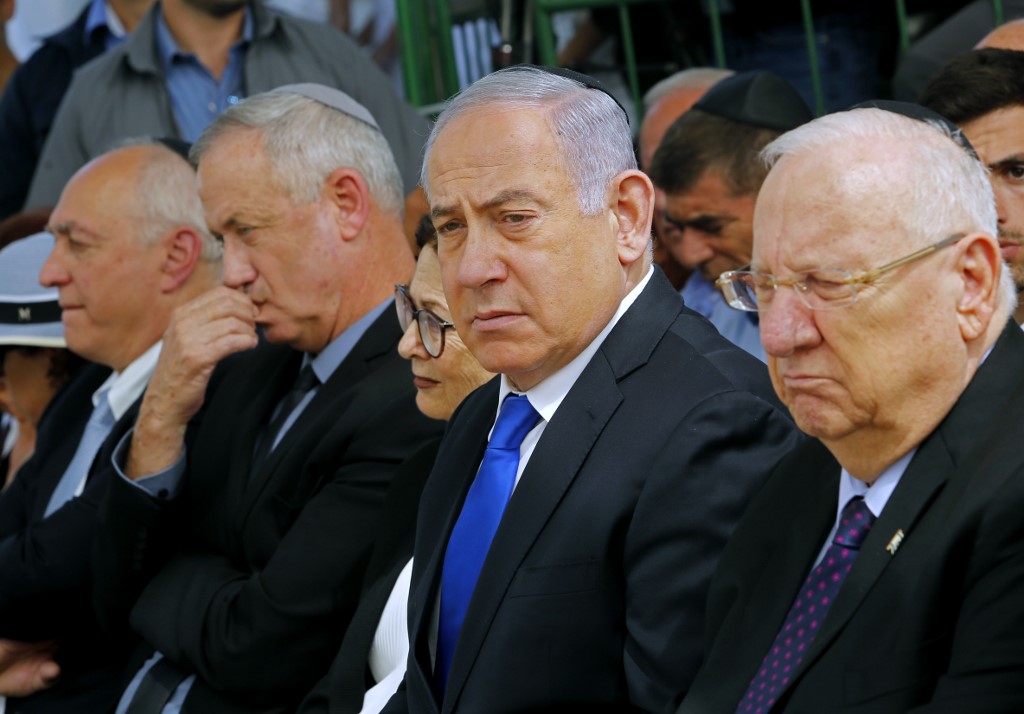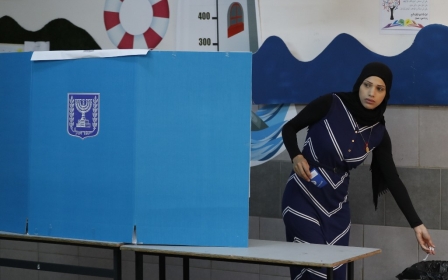Will the Joint List be implicated in Israel's future crimes?

One of the features of Israel’s electoral system since 1948 has been that all political parties who compete must, by law, support Israel’s racist laws and racist foundation, instituted to safeguard Jewish supremacy.
First they used the British Emergency Regulations to suppress Palestinian political activism, and later enacted Israel's Basic Law article 7. A ban had been imposed on anti-Zionist parties, which were criminalised and barred from participation.
This continues to be the case today, more than 70 years since the founding of the Jewish settler-colony.
After Israel’s expulsion of 85 percent of the Palestinian population in the areas of Palestine where it established its state, the founders granted suffrage to the remaining Palestinian population - whom they placed under martial law until 1966 - as the diminished and miniscule number of remaining Palestinians was no longer a demographic threat.
Limited choices
New MEE newsletter: Jerusalem Dispatch
Sign up to get the latest insights and analysis on Israel-Palestine, alongside Turkey Unpacked and other MEE newsletters
During this period, the ruling Mapai party had a virtual monopoly on the country, including the Palestinian communities who lived under the apartheid military regime, enabling Mapai to obtain their votes in return for social services - including military passes that would allow them limited freedom of movement - and making it much more difficult for other political parties to do the same.
The choice for Palestinian voters was limited to Zionist parties whose platforms were based on establishing a colonial Jewish state on the land of the Palestinians, including Menachem Begin’s right-wing Herut party (later the major component of the Likud coalition). Based on their avowed racism, such parties refused to admit Palestinians as members, and were exclusively open to Jews.
[Israel] proceeded to legislate more laws to ensure Jewish supremacy and Palestinian national inferiority
The least offensive party to the Palestinian captives of Israel was the Israeli Communist Party, which was the only one that allowed Palestinians to be members, even though it was equally committed to Zionism. Still, the Communist Party called for an end to military rule over the Palestinians. It often received a minority of the votes of the Palestinian electorate, the majority of which went to Mapai’s Arab satellite lists during this period.
The irony of the situation was such that Begin’s Herut party, along with the Communist Party, was the major force in the Israeli Knesset in 1960 demanding that military rule be lifted and racist Pass laws cancelled, essentially so that Herut could have a chance of breaking Mapai’s electoral monopoly. The Mapai government refused to do so until 1966.
Mapai, which became the major component of the Labor coalition in 1968, went on to rule Israel for another decade without rival. It was in 1977 that Begin and his Likud coalition were finally successful in winning national elections.
Racist system
In the meantime, Israel invaded Egypt, Syria and Jordan in 1967, and acquired a large Palestinian population in Gaza and the West Bank, including East Jerusalem, as well as the remaining Syrians it failed to expel from the Golan Heights.
Unlike in 1948, when the Israelis were able to grant suffrage to the remnants of the Palestinian people, this time around that option was not possible, as they were only able to expel a few hundred thousand people from the West Bank and Gaza.
As the minuscule number of remaining Syrians in the Golan Heights did not threaten Jewish demographic supremacy, Israel annexed the Golan in 1981 and granted them suffrage. The same could not be carried out in Gaza and the West Bank.
The three-tiered, racist system in Israel today comprises a Jewish electorate that can elect leaders committed to Jewish colonisation of the land of the Palestinians; a Palestinian electorate inside Israel that is only allowed to elect leaders who support or must not oppose the ongoing colonisation of their own people and lands; and a Palestinian population denied suffrage completely, who along with their lands have been subject to non-stop Jewish colonisation for decades.
The situation changed for the Palestinian citizens of Israel in 1966 with the demise of military rule - allowing more of them to vote for a new Communist party (Rakah), which split from the more Zionist one (Maki) and included more Palestinians in its candidate list.
It changed again in the 1980s and more in the 1990s, when “Arab parties” began to form on their own or as part of coalitions with Zionist parties that spoke the language of equal rights.
Ensuring Jewish supremacy
It is in that context that Azmi Bishara broke from the Communist Party and formed a new party in 1995, called the National Democratic Assembly (NDA), which called on Israel to become “a state of its own citizens” and not a Jewish state.
Bishara’s party could not legally declare its opposition to the Zionist foundations of the state, according to Israel's Basic Law article 7, but it could question the state’s transnational pan-Jewish commitments that overrode its commitments to its own citizens, which it did openly.
Not only was the Israeli system’s response to these demands swift in its hostility, it also proceeded to legislate more laws to ensure Jewish supremacy and Palestinian national inferiority, the most recent and outrageous of which was the 2018 nation-state law.
This month’s election was a continuation of the same. Two Israeli leaders, whose records of atrocities against the Palestinian people are equally horrific, competed. Benjamin Netanyahu and Benny Gantz are equally committed to the continued colonial policies of Israel and to its racist laws, including the nation-state law, which Gantz supports with minor modifications.
Both leaders have openly expressed their racist attitudes towards Palestinian citizens and the Palestinian captives of the occupied West Bank and Gaza. Yet, the elected leaders of Palestinian citizens of Israel, the Joint List - whose choice is which among Israeli Jewish candidates is less of a war criminal - chose the one they claim is the lesser evil, namely the butcher of Gaza, former Israeli army chief Gantz.
Divide-and-rule strategy
These false and cruel choices have always been a trap for Palestinian citizens of Israel, aimed at implicating them structurally and politically as collaborators with the Israeli leadership in their own oppression and in the oppression of their less fortunate compatriots in the West Bank and Gaza, or in exile. This has always been part of Israel’s divide-and-rule strategy, which is why many opposed participating in the latest elections (still, 60 percent participated).
Elected Palestinians had never before supported one war criminal over the other to become prime minister of Israel
Elected Palestinians had never before supported one war criminal over the other to become prime minister of Israel; to its credit, the NDA was the only party within the Joint List that refused to do so this month.
In 1992, a bloc of Palestinian Knesset members supported Yitzhak Rabin’s government in return for, among other things, his pledge not to destroy Palestinian homes in Jabal Abu Ghneim in occupied Jerusalem - but they did not recommend him to Israel’s president as their prime minister of choice.
Elected Palestinians have traditionally understood that choosing between candidates, all of whom are dedicated to oppressing them, is no choice at all. How will the Joint List escape being implicated in a future Israeli attack on Gaza, or an incursion into West Bank villages, or an assault on Palestinian citizens demonstrating against Israeli government land theft?
If Gantz ends up the next prime minister of Israel or part of a governing coalition with Netanyahu's Likud party, the members of the Joint List who opted for him will have set a precedent that will implicate them in Israel’s war crimes against the Palestinian people for years to come.
The views expressed in this article belong to the author and do not necessarily reflect the editorial policy of Middle East Eye.
Middle East Eye delivers independent and unrivalled coverage and analysis of the Middle East, North Africa and beyond. To learn more about republishing this content and the associated fees, please fill out this form. More about MEE can be found here.







